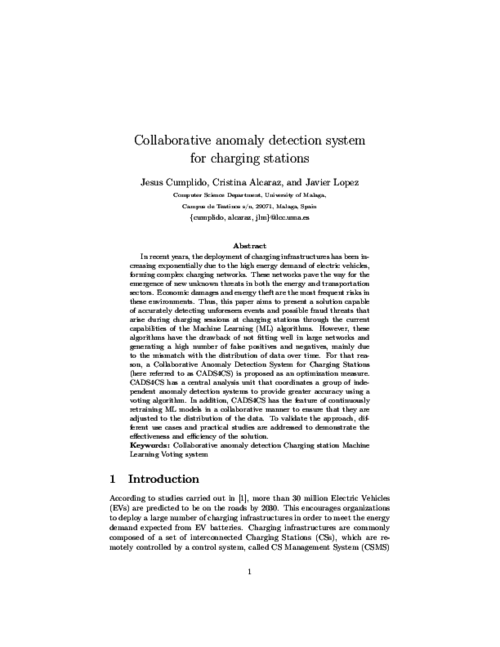| Title | Collaborative anomaly detection system for charging stations |
| Publication Type | Conference Paper |
| Year of Publication | 2022 |
| Authors | J. Cumplido, C. Alcaraz, and J. Lopez |
| Conference Name | The 27th European Symposium on Research in Computer Security (ESORICS 2022) |
| Volume | 13555 |
| Pagination | 716–736 |
| Date Published | 09/2022 |
| Publisher | Springer, Cham |
| Keywords | Charging station, Collaborative anomaly detection, Machine Learning, Voting system |
| Abstract | In recent years, the deployment of charging infrastructures has been increasing exponentially due to the high energy demand of electric vehicles, forming complex charging networks. These networks pave the way for the emergence of new unknown threats in both the energy and transportation sectors. Economic damages and energy theft are the most frequent risks in these environments. Thus, this paper aims to present a solution capable of accurately detecting unforeseen events and possible fraud threats that arise during charging sessions at charging stations through the current capabilities of the Machine Learning (ML) algorithms. However, these algorithms have the drawback of not fitting well in large networks and generating a high number of false positives and negatives, mainly due to the mismatch with the distribution of data over time. For that reason, a Collaborative Anomaly Detection System for Charging Stations (here referred to as CADS4CS) is proposed as an optimization measure. CADS4CS has a central analysis unit that coordinates a group of independent anomaly detection systems to provide greater accuracy using a voting algorithm. In addition, CADS4CS has the feature of continuously retraining ML models in a collaborative manner to ensure that they are adjusted to the distribution of the data. To validate the approach, different use cases and practical studies are addressed to demonstrate the effectiveness and efficiency of the solution. |
| DOI | 10.1007/978-3-031-17146-8_35 |
| Citation Key | Alcaraz2022c |
Collaborative anomaly detection system for charging stations
Paper File:
https://nics.uma.es:8082/sites/default/files/papers/Alcaraz2022c.pdf
